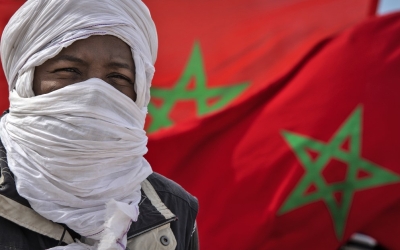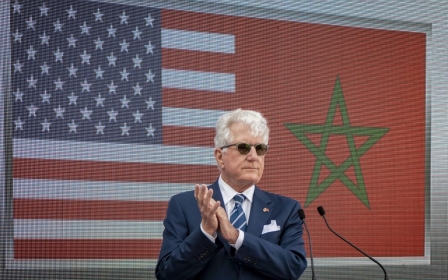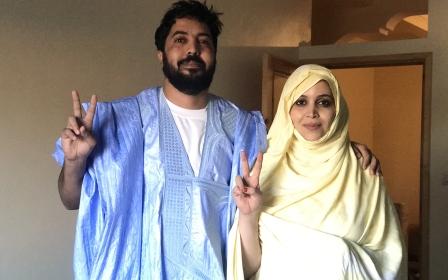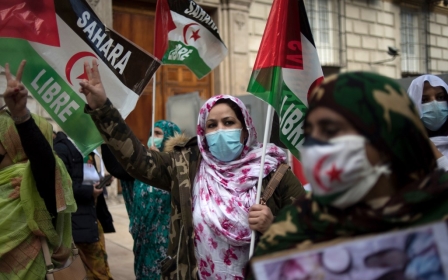Western Sahara rebels launch attack and warn Morocco of escalation

Pro-independence rebels fighting Morocco over the disputed territory of Western Sahara on Sunday vowed a military escalation, hours after launching an overnight attack.
The Polisario Front said they had bombarded the Morocco-controlled area of Guerguerat, a crossing point between Western Sahara and Mauritania in a UN-patrolled buffer zone, according to AFP.
AFP said that it could not obtain independent confirmation of the reported rocket strikes, or of any possible casualties, from the remote desert region that is largely off-limits to journalists.
"The war will continue and escalate," senior Polisario security official Sidi Ould Loukal told AFP by phone. "All positions of the Moroccan army are targets of this war."
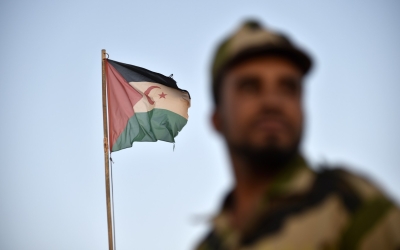
A Moroccan official, however, said that there had only been "harassing fire", labelled the attack claim part of a "propaganda war" and insisted "the situation is normal".
Moroccan TV channel 2M showed images of trucks in the Guerguerat area and reported the situation was "normal" early on Sunday.
Western Sahara is a former Spanish colony contested since the 1970s between Morocco - which controls three-quarters of it - and the Algeria-backed Polisario Front, which demands independence for what it calls the Sahrawi Arab Democratic Republic.
A UN-backed political process has been suspended since March 2019, and the two sides remain separated by a 2,700-km sand barrier.
Tensions rose sharply when Morocco on 13 November sent troops into the buffer zone to reopen the only road leading from Morocco to Mauritania and the rest of West Africa, after separatists had blocked it the previous month.
The Polisario responded by declaring the 1991 ceasefire null and void, arguing that the road had not existed when the truce was signed and was therefore illegal.
'Chaotic' situation
The two sides are reported to have since exchanged regular fire along the demarcation line.
The pro-independence rebels overnight launched four rockets toward Guerguerat, the Sahrawi press agency SPS said, also reporting attacks along the security barrier.
The Guerguerat road crossing had been "closed" and the situation there was "chaotic", said Ould Oukal, secretary-general of the Sahrawi ministry of security.
"This is only the beginning," he said. "It is a warning to the users of this road and this land. The whole territory of Western Sahara is a war zone and is not safe."
'We have waited 30 years - 30 years of broken promises, prevarication and untenable waiting'
- Sidi Ould Loukal, senior Polisario security official
The senior Moroccan official contacted by AFP in Rabat, however, said: "There was harassing fire near the area of Guerguerat, but it did not affect the trunk road, traffic was not disrupted. It's been part of a cycle of harassment for more than three months."
"There is a desire to create a propaganda war, a media war, on the existence of a war in the Sahara", but "the situation is normal", he said.
The UN-backed ceasefire deal was meant to lead to a referendum on self-determination for the territory, about the size of Britain and home to about one million people.
Morocco has offered autonomy but maintains that the territory is a sovereign part of the kingdom.
Rabat has won the recognition of its claim to sovereignty over the entire disputed territory from numerous countries that have opened consulates in Western Sahara.
Polisario will 'keep up armed struggle'
Former US President Donald Trump late last year also backed Morocco, breaking decades of precedent, in exchange for Rabat normalising relations with Israel. In doing so, Morocco became the fourth Arab country to establish full diplomatic ties with Israel in the space of four months.
“Today, I signed a proclamation recognizing Moroccan sovereignty over Western Sahara. Morocco's serious, credible, and realistic autonomy proposal is the ONLY basis for a just and lasting solution for enduring peace and prosperity!” Trump had tweeted.
Israeli Prime Minister Benjamin Netanyahu had described the deal as "another great light of peace".
The Polisario Front, which fought a war for independence from Morocco from 1975 to 1991, has said it is still willing to join UN talks on the territory's future - but would not lay down its arms.
"In the past, we put all our trust in the international community and definitively ended our armed struggle," Ould Loukal said on Tuesday.
"We have waited 30 years - 30 years of broken promises, prevarication and untenable waiting."
Ould Loukal insisted the group was "open to any mediation. But at the same time, we will keep up the armed struggle, based on past experiences".
Middle East Eye delivers independent and unrivalled coverage and analysis of the Middle East, North Africa and beyond. To learn more about republishing this content and the associated fees, please fill out this form. More about MEE can be found here.


